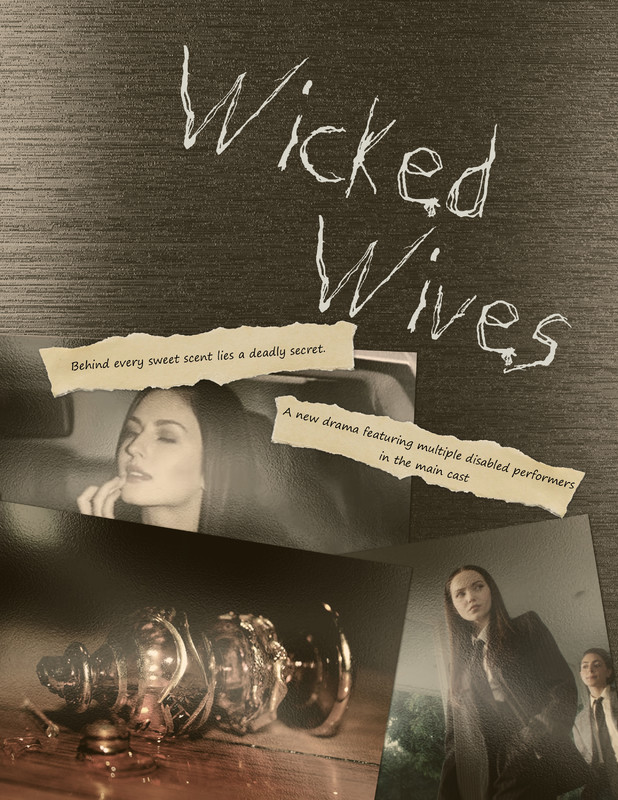NINA NAVAL AND NATALIE VALDEZ
Nina Naval is an actor, filmmaker, and photographer with a passion for disability rights and representation in the entertainment industry. Born and raised in Metro Manila, Philippines, Nina's interest in the arts began at a young age, and she later went on to attain her BFA in Drama, along with minors in Disability Studies and Anthropology, from New York University. As a disabled woman who uses a wheelchair to travel long distances, Nina has become a fierce advocate for accessibility and inclusion in the creative industry. She aims to increase representation for disabled artists, and works to engage with the global creative community to spark meaningful change. Learn more about Nina and her projects at https://www.ninanaval.com/
Natalie Valdez is a senior at New York University's Tisch School of the Arts, where she is pursuing a BFA in Drama. As an actor and writer, Natalie is passionate about storytelling and the power of the arts to inspire change. Originally from Florida, she now calls New York home, where she immerses herself in the city's vibrant theater scene. Despite facing the challenges of chronic illness, Natalie remains dedicated to her craft and continues to create thought-provoking and impactful work.

Wicked Wives is a contemporary continuation of the story of Giulia Tofana, a woman in the 1600's who used to sell a poison packaged as cosmetics (named Aqua Tofana) to women looking to escape their marriages.
Wicked Wives's story follows Julia Sparrow, a young disabled woman who inherits her family's perfume company (Pour Le Noir) as well as their under-the-table business of selling poison to people looking to escape their less-than-ideal marriages, and a young detective named Michael Wilson, who is trying to investigate a series of seemingly-unrelated murders. Will Julia be able to keep her family's lethal business under the radar? Only time can tell.
The show's main cast will feature five disabled women/trans actors as the people who run Pour Le Noir, alongside two men as detectives trying to investigate it.

1. What topic do you discuss in your script? And why?
Domestic violence, vigilante justice, women empowerment, and injustice within the justice system.
2. How do people feel after reading your script?
We hope that they feel intrigued and curious!
3. Do you think that films can change people for the better or for the worse?
We both believe it depends on the film and what the film aims to promote and invoke in its audience.
4. According to 3-act dramaturgy, how would you define your story?
The beginning of our script introduces the two main characters who define each end of the spectrum of morality. Where Michael believes in rules and by-the-book justice, Julia believes that some justices need to be taken into your own hands regardless of the rules set forth by society. The story progresses through Julia's empire built off of her ancestors legacy that aims to empower victims of abuse by giving them a tool to escape their abusers. Michael, on the other hand, aims to hunt down the person responsible for a series unexplained deaths around the city which leads him to discover a much more in depth investigation than he had originally thought. The story continues to explore the blurred lines between right and wrong and our characters ultimately face the moral question of what is justice and how it should be served.
5. How does the main character develop?
Julia learns that there are limits to her power and not all problems need to be solved on her own but rather there is value in friendship and trusting others with your vulnerabilities. Micheal learns that rules and regulations are not always made to be followed and that trusting your self can be more important than that of what is enforced.
6. What actors do you imagine in your project (typologically)?
We aim to cast our show in a way that highlights the disabled community and creates a space to represent them in the media and change the perception that society tends to have of said community. Many times, disabled people and the characters they play are limited to an arc centering on their disability. Wicked Wives, however, provides an opportunity for disabled people to tell a universally relatable story without disability being a plot point and for non-disabled people to see us in a new light.
7. Why do you think your script should attract director?
We believe that our show is unique in that it challenges the audience to think about morality and justice while maintaining the relatability we all seek in media.
8. At which festivals did you receive the award?
This is one of the first festivals that we have submitted Wicked Wives to but most recently we were selected for The New York Screen Writing Awards.
9. Which screenwriters are your favorite and why?
Our favorites are: Shanda Rhimes , Amy Sherman Pallidano and Mindy Khaling.
10. Abour which topics are your screenplays?
Nina personally enjoys exploring dichotomies in her writing. For example, what defines right vs. wrong, where does that line blur, and what happens when those lines are crossed. At the same time, as a disabled woman of color from the Philippines, she likes providing a space for underrepresented communities in universally relatable stories.
Natalie personally prefers to act as a co-writer by bringing new and fresh ideas to an already established story and does not personally write her own stories.
11. What motivates you the most to write screenplays?
Nina enjoys taking the stories from her imagination to life, usually with the help of music blasted through her headphones.
12. What are your plans in future careers?
Both Natalie and Nina hope continue being in the industry both in the writers room and out.
